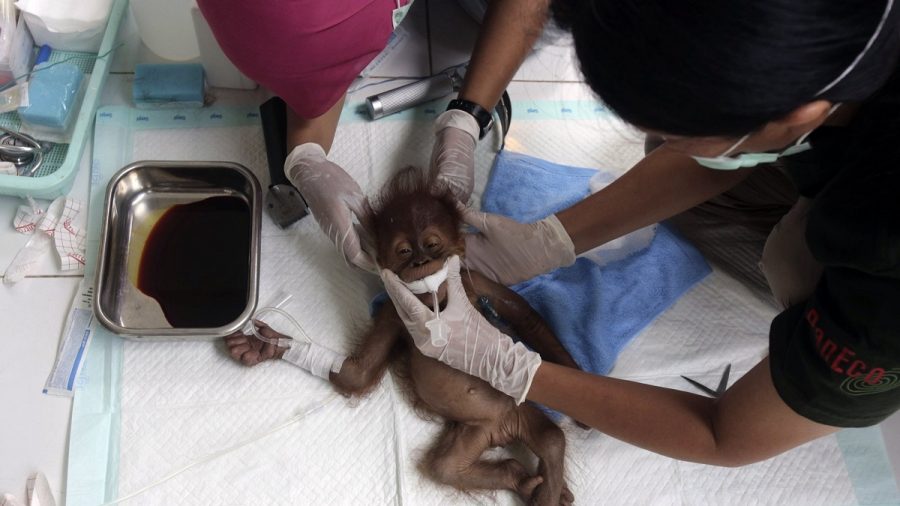SIBOLANGIT, Indonesia—An orangutan mother has been blinded after being shot with at least 74 air gun pellets on Indonesia’s Sumatra island, where threats to the endangered species have increased as the palm oil and paper industries shrink its jungle habitat.
An X-ray showed at least 74 air gun pellets in her body, including four in her left eye and two in the right, said veterinarian Yenny Saraswati with the Sumatran Orangutan Conservation Program.

The great ape, named “Hope” by her rescuers, also had several wounds believed to have been caused by sharp objects, she said Monday, March 18. Hope also was recovering from surgery to repair a broken collarbone.
Villagers spotted the severely wounded orangutan in a farm in Aceh province’s Subulussalam district last week with her month-old baby, which was critically malnourished, said Sapto Aji Prabowo, who heads the Aceh provincial conservation agency.
The baby died as rescuers rushed the pair to a clinic in neighboring North Sumatra province’s Sibolangit district.
Orangutan mother blinded by air gun pellets in Indonesia
1 / 7
In this photo taken on Sunday, March 17, 2019, a veterinarian and a volunteer of Sumatra… | https://t.co/EA3XhL06Yk pic.twitter.com/SjVVbglmC8
— Rocketnews (@Rocketnews1) March 19, 2019
“Hopefully Hope can pass this critical period, but she cannot be released to the wild anymore,” Saraswati said, adding that only removed seven of the pellets were removed because the veterinarians prioritized the broken collarbone and the risk of infection that it posed.

The orangutan conservation program said the use of readily available air guns to shoot and kill wildlife, including orangutans, is a major problem in Indonesia.
It said in the last 10 years, it has treated more than 15 orangutans with a total of nearly 500 air gun pellets in their bodies.
Last year, an orangutan in the Indonesian part of Borneo died after being shot at least 130 times with an air gun, the second known killing of an orangutan that year.

A 2018 comprehensive study of Borneo’s orangutans estimates their numbers have plummeted by more than 100,000 since 1999, as the palm oil and paper industries shrink their habitat and fatal conflicts with people increase.
An endangered orangutan was found blinded and near death after she was stabbed and shot 74 times by an air rifle. Her tenacity to survive moved rescuers, who have named her Hope. https://t.co/FsM1Dd6VBy
— New York Times World (@nytimesworld) March 19, 2019
Only around 13,400 Sumatran orangutans remain in the wild. The species is listed as critically endangered by the International Union for the Conservation of Nature.
By Binsar Bakkara And Niniek Karmini


